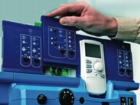How much control?

Joerg Buetow questions the need for expensive building-management systems in heating installations in some circumstances.
When designing new or replacement heating systems for larger scale commercial and industrial buildings, specifiers have to decide on the most appropriate controls. Traditionally this is usually a building management system (BMS), which is used to control all the main building services including heating and lighting.
In many cases where the main function of the building-management system is to control the heating system, a separate BMS is not always the best option — especially if the heating-system manufacturer can offer its own dedicated controls package. This is likely to be much less expensive than a BMS, and, perhaps more importantly, will offer significant efficiency gains as it is designed specifically for the heating and hot-water system.
A dedicated controls package that can precisely manage fuel consumption and manage the energy usage will also be much less complicated to set up, operate and maintain. Indeed, setting up a BMS usually requires the services and costs of a specialist to programme the many functions.
A modular controls package, such as the recently upgraded Buderus 4000 series, from an established heating manufacturer is designed to ensure efficient heating-system operation that exceeds existing Building Regulations and provides a comprehensive level of functionality that includes full control of the boilers and necessary safety devices. Indeed it is quite possible that it could provide an even higher level of control than a BMS because it is designed specifically for the boilers to which it is connected. Theoretically it is possible for a BMS to mirror the functionality of a manufacturer’s specialist heating-system control package, but in practice this can be cost prohibitive because of the amount of original re-programming that would be required.
The 4000 series for example offers an expandable, modular design that can be programmed to build system functionality and adapt to new technology, especially renewables. It also provides efficient control for the whole heating system including multiple heating circuits and hot water. Individual control modules are simply slotted into place, making retro-fit straightforward and cost-effective. Functions such as cascade sequencing, to even out boiler wear-and-tear, load compensation to prevent energy wastage and in-built legionella protection allow the heating system to be fined-tuned to a level that is just not possible with a generic BMS. Specially developed for modern low-carbon buildings, the simple ‘plug-and-play’ 4000 series can be seamlessly integrated with the main boiler and works ‘intelligently’ with it, using different heating strategies depending on the boiler type e.g. for high or low water content boilers.
Such controllers can be factory preconfigured with basic heating programs that can be easily adapted by the heating installer simply by adjusting the parameters of the preset heat curves to best suit the needs of the particular installation. Such work can be carried out off-site This is vastly easier than setting up a complex BMS program.
A dedicated heating-system controller will also include features less likely to be in a BMS, such as frost and backend system protection. The 4000 can also integrate with alternative or renewable systems such as solar and heat pumps, solid-fuel and biomass boilers which can be included from the initial specification of the heating system or added later. However, there will be situations where a generic BMS could be preferable, such as when a wider range of building facilities require control which would make a separate heating control less necessary. However, the specifier needs to carefully analyse costs, particularly those associated with fuel efficiency gains, against functionality to see if true value for money is being obtained, not just in the short term capital outlay, but also in the longer term and throughout the life of the heating system. Joerg Buetow is technical manager with Buderus.








